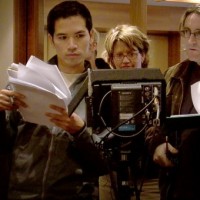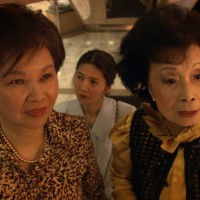
Heng Tang’s debut short film Boy-Serpentine world premiered at the 54th Venice Film Festival winning the jury special mention prize. His second, The Other Son, screened in Venice at the 56th festival. He is the first filmmaker in Australia invited by Cannes Film Festival Cinefondation to attend their residency program to develop feature projects. Following that, another short, The Last Chip, qualified for pre-selection at the 2007 Academy Awards. His latest film Mooncake & Crab premiered at the 60th Melbourne International Film Festival.
1. What’s the greatest challenge to you as a practitioner?
Filmmaking is unfortunately outrageously costly and raising finance from various sources is incredibly time-consuming and emotionally exhausting. To make matters worst the government film funding bodies
have abandoned their “cultural imperative” policy in favour of “commercial imperative”. Thus less and less films of cultural and artistic value are receiving grants whereas more genre “movies” are being funded. It’s a strong tide that many non-mainstream filmmakers are unable to stem.
And then there is the creative challenge of making films with unconventional cinematic language that is frowned upon by funding bodies, investors (who want to make their money back) and an increasingly television brain-washed audiences who can only handle fast paced editing and story laden narratives. So non-mainstream
filmmakers are finding that they have to be smarter financially in order to capture the dwindling art film demographic without going into the red.
2. What was your goal when you made The Last Chip and Mooncake & Crab?

With The Last Chip, I wanted to reveal the little known lives of problem gamblers and shatter the “glamour” of our state sanctioned casinos in our country. I knew the funding bodies favour “entertaining” projects so I decided to camouflage it in 80’s B-grade Hong Kong black comedy genre style without losing the bleakness of the issue.
Mooncake & Crab (written by Isabelle Li) did a complete 180 degree
turn in terms of style. I chose a gentler, more classically
conventional style to tell the story of an unconventional Chinese
woman who is unfaithful to her husband. Despite its aesthetics of a straightforward drama, it’s actually a subtly subversive story of a dutiful Chinese woman who betrays her faithful Causcasian husband with a younger Chinese man. Kind of like Madame Butterfly in reverse but contemporary and relevant to current societal expectations.
3. What do you hope audiences take away from your films?
I prefer my films not to be black & white but with lots of greys. So I hope audiences debate about the ambiguity of the characters long after the screening. The Last Chip did polarise Asian audiences who found it offensive and taboo to discuss, but Western audiences were fascinated by it, as it is a world they may not have access to.
4. Who inspires you in filmmaking? Why?
I’m inspired by writers more so than filmmakers but if I had to name directors I would have to say Claire Denis, Tsai Ming Liang, Catherine Breillat, Tran Anh Hung, Ang Lee. David Lynch, Bertrand Bonello, Andrei Tarkovsky, etc. because they do not interpret the written word literally but impressionistically. I admire their relentless boldness
in going against conventional linear narrative type television language.
5. What’s your impression of the Asian Film Forum and Network (AAFFN)?
It’s an essential convergence of screen/media practitioners and academics to discuss issues and cultural trends facing all aspects of the discipline. The production aspects of the screen media industry must not be separated from the academic assessment/research as this avoids the dumbing down of the production industry, which is
increasingly becoming more commercial/profit focused. I found it very refreshing and engaging intellectually and emotionally to be conferring with various practitioners in such varied fields of screen culture.
6. Where do you think the AAFFN should head to next?
It would be good to perhaps have it in tandem with an existing Asian film event/festival like the Asia Pacific Screen Awards, Brisbane International Film Festival, or the Adelaide Film Festival.


1 thought on “Q&A – Heng Tang”